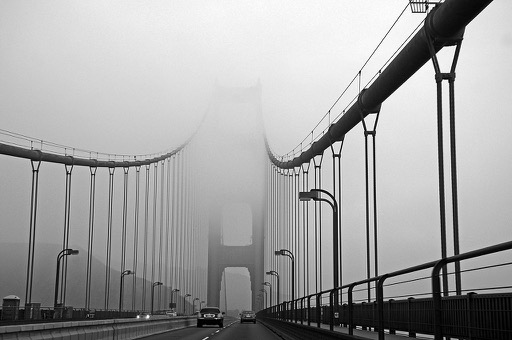AbSensation

Unattributed: Fog On The Golden Gate Bridge (Free public download image)
"AbSensations might be the means by which one adjusts to absences."
Which of the five primary senses seems most powerful to you? Sight? Hearing? Taste? Smell? Touch? Many of us feel attracted to one over the others. I know myself to prefer auditory input, though I cannot stand to attend loud concerts which seem to abuse the privilege sound imparts. The Muse seems much more visually sensitive than I. She's likely to see stuff I pass by without noticing. I used to, when teaching workshops, sit in the back of the room with my eyes closed so that I could better 'see' what was happening during exercises. I mostly see with my ears, it seems. The Muse can taste flavors I cannot register. Senses serve as definite discriminators, better determining differences than almost any other measurement. For my money, though, I've concluded that the AbSensation proves the most dependably powerful. ©2021 by David A. Schmaltz - all rights reserved
The AbSensation, that sensation allowing us to sense an absence, seems most present, though it seems as though it exclusively trades in stuff none of the five primary senses can touch. An absence does not in any objective sense even exist, yet it can overwhelm one's feelings. A frame surrounding nothing can sometimes evoke more emotion than the work of any Old Master. The sculpture that isn't there any more might well induce deeper feelings—nostalgia, for instance—than any present one. Sudden vacancies seem the most evocative. Losing a close family member seems to carve a hole through my heart which emits more love than I ever remember that muscle producing before.
They say that absence makes hearts grow fonder, an apparent paradox worth pondering long and hard. Appreciate as you might people within your sight. Their sudden absence might well produce affections surpassing any you physically expressed in their presence. By then, of course, it will have already been too late to make up any deficit, but we might take it easy on ourselves. Affection for an absence seems of a different order and might well prove out of order for any presence situation. One need not ever pine after anyone present. No nostalgia blooms for anyone or anything not lost. AbSensation seems of a unique and different order, not reasonably comparable to any other kind. AbSensation seems especially personal, perhaps never intended to become sharable in kind. I express it in writing. Others in solitary crying. Some insist it's suffering; others, that it's just a particularly intense form of loving.
AbSensations seem by nature unrequitable. They cannot be returned in kind. Because of this, they might serve as dedication tests for self regard. An innocent love might require confirmation, another to express their resonance, but AbSensations seem more internal and echo-y. They seem destined to disappoint with despair if I'm expecting another's equivalent acknowledgement of my experience. The object of my affection's absent and unable to confirm my admiration. I must accept my worthiness to send as well as receive these sensations. I might well experience these to comfort myself, as curious as this notion might seem when I'm weeping. I sense most deeply the absent possibilities I'd apparently grown to depend upon. I'd imagined a different story. AbSensations might be the means by which one adjusts to absences.


